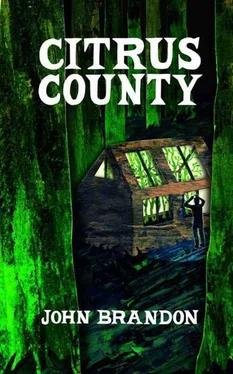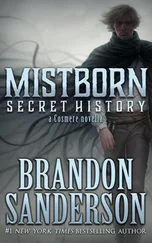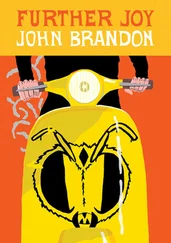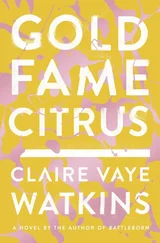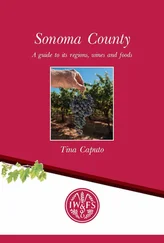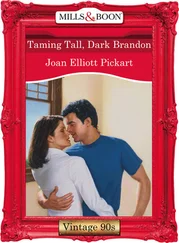“Hold up,” Mr. Hibma said. He knew Shelby’s aunt’s website. He went on it from time to time and read reviews of performance artists. He hated performance artists.
“So you had that Stubblefield lady as one aunt,” Mr. Hibma said. “The lady in Tennessee, in the barn. And then you have expatriate Aunt Dale as another aunt.”
“Right, but Janet Stubblefield wasn’t my real aunt.”
“And both of them are nuts in a pleasing way.”
Shelby looked skeptical.
“Oh, Aunt Dale’s nuts,” said Mr. Hibma. “She’s dedicated her life to conjecturing what impression Martians might have of Earthly customs.”
“Abnormal,” Shelby conceded.
“Do you know how many people are abnormal in a way that pleases me?”
“In the world?”
“Let’s estimate.”
“Four hundred?”
This seemed a perfect guess. “And you have two of them for aunts.”
Mr. Hibma wondered if Aunt Dale had ever visited Citrus County. The area seemed ripe for whatwouldtheythink . It was unimpressive in a noteworthy way. Mr. Hibma could see Aunt Dale at the Best Western lounge, chatting with the mermaids. He saw Aunt Dale down at Hudson Beach — a scatter of damp dirt and a burger bar with Calypso music. Mr. Hibma saw himself serving Aunt Dale dinner in his villa. “The drywall is all original,” he would tell her. He would serve calzones, baked by the Long Islanders down the street.
Mr. Hibma dismissed the class, allowing each kid to grab a poster on the way out, something they now did out of obligation. He’d broken into a long patch of straight-to-video action movies — beefy, confused-looking men and women with shiny cleavage.
When the last kid was gone, Mr. Hibma shut the door. He stared at a Bosch print. Grotesque birds. Women with bonnets. Demons hiding in big eggs — or were they being born? Bosch had captured the horror so deftly that it seemed to echo. Mr. Hibma felt he might find himself in the painting, walking around lost with chalk in his pockets.
He was very jealous of Aunt Dale. He was meant to do few things, and what Aunt Dale did, criticize, was one of them. She’d made better decisions than Mr. Hibma and had ended up in a better life. That’s what Mr. Hibma should’ve done with his inheritance: started whatwouldtheythink . He never should’ve ended up throwing a dart. He should’ve chosen his life.
He sat down at his desk and squared a sheet of paper in front of him, readied a pencil, then wrote the following letter:
D,
I plan to kill a fifty-something-year-old woman in early June, an English teacher, and I would like to invite you to review the murder, to evaluate it as a work of art. I will smother this woman with a couch pillow. I have told no one of this but you.
Mr. H
Mr. Hibma did not feel in possession of himself. He didn’t know why he’d written this letter. He felt again like a character in a novel. Not a passive character, though — not at the moment. His story was going somewhere.
Mr. Hibma wasn’t going to mention which county he lived in, certainly wasn’t going to mention Shelby. In fact, he would drive to the middle of the state, somewhere near Orlando or something, so the postmark wouldn’t give him away. Mr. Hibma was going to go home and dig up the address of whatwouldtheythink . He was going to get an envelope out and slip his letter inside and he was going to drive to Clermont or wherever and pay whatever you had to pay to mail something to Iceland. First he was going to get a PO Box in Clermont, and he was going to use that PO Box as his return address. And he was going to have his mail from that PO Box forwarded to his villa. He was doing something. He was taking part in his life.
Toby had received, on his locker, a card informing him that his pole-vaulting book was overdue. The fine was a quarter a day. There was no mention of a maximum fine the book could accrue, of a retail value the library put on the book. Toby didn’t know if he could simply re-borrow the book, or if the library would take it away from him and put it back on the shelf, in case another student wanted a turn with it. Toby wanted to keep the book till the end of track season. He was going to keep it and then pay the fine. He had an allowance now. He could afford it. Not that the book was helping a great deal. All Toby could claim to have mastered, so far, was his natural fear of hurtling through the air. His grip and his stride were coming along. Except for the moment when he was supposed to gain altitude, to shoot upward, he could approximate the look of a pole-vaulter. He was a member of the track team. He was on the team. That was the important thing.
The first meet was upon him. Toby rode the bus with his teammates out to a complex that bordered the rock quarries, near the grounds of Lecanto Middle School. There was no crowd, not even parents. Toby drank a soda then jogged a lap around the track. There was only one pole-vaulter on the opposing squad, a sturdy Asian kid who wore a visor. Toby went over like a stand-up sportsman and shook the kid’s hand, and the kid wished Toby luck in claiming one of the two all-county spots. There were six pole-vaulters total, the kid explained. He, himself, would have one of the spots, and the other one was up for grabs. He told Toby one of the most pivotal parts of pole vault, this season at least, would be the coin flips. It would be crucial to never go first, because if you went first you didn’t know what height you had to beat. Pole-vaulters were supposed to alternate turns, but last year two kids had kept bumping shoulders as they crossed paths and they ended up getting in a fight. One of the kids got his tooth knocked out, the Asian kid told Toby, so now one vaulter went three times, then the other went three times.
Toby couldn’t quite follow all this. “The coin flip?” he said.
“I’ve got it mastered.” The Asian kid had a twinkle in his eye. “I’ve been practicing for months.”
“You can be good at coin flips?”
“Same as anything: practice.”
“When you practice, do you flip the coin yourself?”
“That wouldn’t do much good.”
Toby went off by himself to stretch. His team was designated the home team, so he would be the one to call the flip in the air. He wanted to call this thing right and tell the Asian kid that he hadn’t practiced a bit, that he was just a fortunate person. Toby drank some water, sized up the bar, and threw himself on the mat a few times. The 400 started. The runners flew up the straightaway, then bunched on the curve. When they passed Coach Scolle he ran with them for a stretch, grunting. Rosa and Sherrie sat in the direct center of the field, back to back, eating fries one by one. The female long-distance runners perched themselves atop the big coolers and painted their nails. When the 400 ended, there was no cheering. The runners slapped each other’s arms and climbed into the bleachers.
Here came the pole-vault official, silver dollar resting in his palm. He told Toby to call it, then tossed the coin and retreated a step. The silver dollar seemed huge. It somersaulted unhurriedly in the air.
“Tails,” Toby said.
The coin did not bounce. It was cradled by the grass, heads up. Toby looked at the Asian kid, who wasn’t bothering to gloat.
“You didn’t do anything,” Toby scolded him. “I’m the one who called it.”
“You went with your gut, didn’t you?”
“Flip it again,” Toby said to the official. “Just for fun. I want him to call it.”
“What will that prove?” said the Asian kid. “It’s a meaningless flip.”
“Pretend it has meaning.”
“Pretend?”
“Nice and high, now,” Toby said.
The official was amused. He flipped the coin.
Читать дальше
